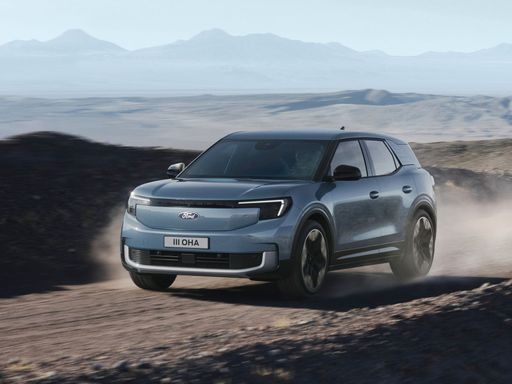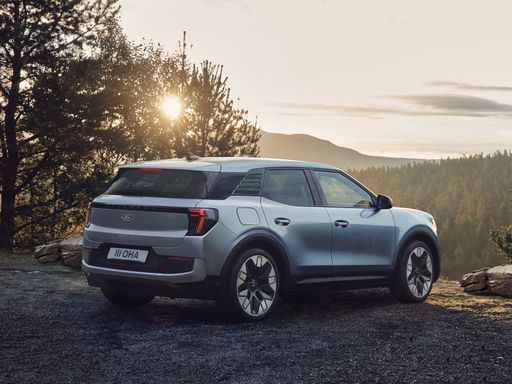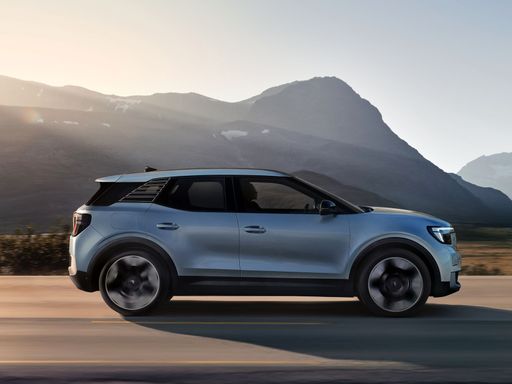Ford Explorer EV vs ZEEKR 7X - Differences and prices compared
Costs and Efficiency:
Price and efficiency are often the first things buyers look at. Here it becomes clear which model has the long-term edge – whether at the pump, the plug, or in purchase price.
Ford Explorer EV has a distinct advantage in terms of price – it starts at 34200 £, while the ZEEKR 7X costs 45400 £. That’s a price difference of around 11220 £.
In terms of energy consumption, the advantage goes to the Ford Explorer EV: with 14.50 kWh per 100 km, it’s clearly perceptible more efficient than the ZEEKR 7X with 17.70 kWh. That’s a difference of about 3.20 kWh.
As for range, the ZEEKR 7X performs barely noticeable better – achieving up to 615 km, about 13 km more than the Ford Explorer EV.
Engine and Performance:
Power, torque and acceleration say a lot about how a car feels on the road. This is where you see which model delivers more driving dynamics.
When it comes to engine power, the ZEEKR 7X has a decisively edge – offering 646 HP compared to 340 HP. That’s roughly 306 HP more horsepower.
In acceleration from 0 to 100 km/h, the ZEEKR 7X is distinct quicker – completing the sprint in 3.80 s, while the Ford Explorer EV takes 5.30 s. That’s about 1.50 s faster.
In terms of top speed, the ZEEKR 7X performs slightly better – reaching 210 km/h, while the Ford Explorer EV tops out at 180 km/h. The difference is around 30 km/h.
There’s also a difference in torque: ZEEKR 7X pulls minimal stronger with 710 Nm compared to 679 Nm. That’s about 31 Nm difference.
Space and Everyday Use:
Cabin size, boot volume and payload all play a role in everyday practicality. Here, comfort and flexibility make the difference.
Seats: offers more seating capacity – vs .
In curb weight, Ford Explorer EV is noticeable lighter – 1908 kg compared to 2395 kg. The difference is around 487 kg.
In terms of boot space, the ZEEKR 7X offers somewhat more room – 539 L compared to 450 L. That’s a difference of about 89 L.
When it comes to payload, Ford Explorer EV slightly takes the win – 585 kg compared to 485 kg. That’s a difference of about 100 kg.
Who comes out on top?
Overall, the ZEEKR 7X shows itself to be wins the duel decisively and secures the title of DriveDuel Champion.
It convinces with the more balanced overall package and proves to be the more versatile choice for everyday use.

ZEEKR 7X
Costs and Consumption
View detailed analysis
Engine and Performance
View detailed analysis
Dimensions and Body
View detailed analysis
Ford Explorer EV
The Ford Explorer EV translates the familiar big‑American SUV presence into whisper‑quiet electric motoring, offering roomy seating and a tech‑forward cabin that will please families and road‑trippers alike. It drives with more composure than its boxy looks suggest, blending a comfortable ride and eager acceleration while undercutting the guilt of gas stops — a practical, modern alternative for buyers who want Explorer space with electric charm.
details @ Ford Motor Company / Ford Media Center
@ Ford Motor Company / Ford Media Center
 @ Ford Motor Company / Ford Media Center
@ Ford Motor Company / Ford Media Center
 @ Ford Motor Company / Ford Media Center
@ Ford Motor Company / Ford Media Center
ZEEKR 7X
The ZEEKR 7X is a striking entry into the electric vehicle market, blending sleek aesthetics with a promise of cutting-edge technology. Its design exudes modern luxury while offering advanced features tailored for tech-savvy drivers. Positioned as a competitor in the premium electric segment, the 7X aims to deliver a dynamic driving experience alongside eco-friendly credentials.
details
 @ Ford Motor Company / Ford Media Center
@ Ford Motor Company / Ford Media Center
|
|
|
|
|
Costs and Consumption |
|
|---|---|
|
Price
34200 - 48800 £
|
Price
45400 - 54000 £
|
|
Consumption L/100km
-
|
Consumption L/100km
-
|
|
Consumption kWh/100km
14.5 - 17.2 kWh
|
Consumption kWh/100km
17.7 - 19.9 kWh
|
|
Electric Range
360 - 602 km
|
Electric Range
480 - 615 km
|
|
Battery Capacity
52 - 79 kWh
|
Battery Capacity
-
|
|
co2
0 g/km
|
co2
0 g/km
|
|
Fuel tank capacity
-
|
Fuel tank capacity
-
|
Dimensions and Body |
|
|---|---|
|
Body Type
SUV
|
Body Type
SUV
|
|
Seats
5
|
Seats
5
|
|
Doors
5
|
Doors
5
|
|
Curb weight
1908 - 2179 kg
|
Curb weight
2395 - 2535 kg
|
|
Trunk capacity
445 - 450 L
|
Trunk capacity
539 L
|
|
Length
4468 mm
|
Length
4787 mm
|
|
Width
1871 mm
|
Width
1930 mm
|
|
Height
1630 - 1639 mm
|
Height
1650 mm
|
|
Max trunk capacity
1417 - 1422 L
|
Max trunk capacity
-
|
|
Payload
561 - 585 kg
|
Payload
455 - 485 kg
|
Engine and Performance |
|
|---|---|
|
Engine Type
Electric
|
Engine Type
Electric
|
|
Transmission
Automatic
|
Transmission
Automatic
|
|
Transmission Detail
Reduction Gearbox
|
Transmission Detail
Reduction Gearbox
|
|
Drive Type
Rear-Wheel Drive, All-Wheel Drive
|
Drive Type
Rear-Wheel Drive, All-Wheel Drive
|
|
Power HP
170 - 340 HP
|
Power HP
421 - 646 HP
|
|
Acceleration 0-100km/h
5.3 - 8.7 s
|
Acceleration 0-100km/h
3.8 - 6 s
|
|
Max Speed
160 - 180 km/h
|
Max Speed
210 km/h
|
|
Torque
310 - 679 Nm
|
Torque
440 - 710 Nm
|
|
Number of Cylinders
-
|
Number of Cylinders
-
|
|
Power kW
125 - 250 kW
|
Power kW
310 - 475 kW
|
|
Engine capacity
-
|
Engine capacity
-
|
General |
|
|---|---|
|
Model Year
2024 - 2025
|
Model Year
2025
|
|
CO2 Efficiency Class
A
|
CO2 Efficiency Class
A
|
|
Brand
Ford
|
Brand
ZEEKR
|
What drive types are available for the Ford Explorer EV?
The Ford Explorer EV is available as Rear-Wheel Drive or All-Wheel Drive.
The prices and data displayed are estimates based on German list prices and may vary by country. This information is not legally binding.
